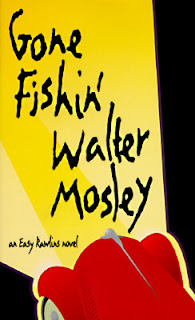Just as I was diving into James Ellroy's twisted version of Los Angeles in the post-war era, along came Walter Mosley's first novel, Devil in a Blue Dress (1990). I grabbed it probably after hearing it reviewed on NPR. It was presented as a hardboiled LA crime story, but told from the perspective of someone who was never the protagonist in any of the classic stories; a black man. It's a good book and a terrific debut novel. It led me to read six more Easy Rawlins books as they came out as well as the first Socrates Fortlow book, Always Outnumbered, Always Outgunned (1997). The latter is an absolutely fantastic book, disappointingly filmed by Michael Apted and starring Laurence Fishburne.
Ezekiel "Easy" Rawlins is a WWII veteran and aircraft factory worker when he falls into investigating the location of a white woman who frequents black bars. Worried about paying his mortgage after losing his job, Rawlins agrees. Along with the expected twists and dangers from a hardboiled mystery, Mosley delivers plenty about race and class in post-war America. It's not a perfect book - there's a bit too much deus ex machina via a certain character - but it's a damn good one. The movie, starring Denzel Washington as Easy and Don Cheadle as Mouse (which is the first time I noticed him and he blew away everyone else on the screen and in the theater), is solid, too.
The first five books - Devil in a Blue Dress, A Red Death (1991), White Butterfly (1992), Black Betty (1994), and A Little Yellow Dog (1996) - are an absolutely terrific addition to the hardboiled canon. The speed of those five books' appearance is reflected in the headiness and urgency in Mosely's writing. Part of their goal is to open wide the genre and expand its purview beyond the same old white heroes. Nonetheless, they remain true to the tropes and forms. In the foreword to the 30th-anniversary edition of Devil, Mosely wrote:
Easy is not afraid of death. He cannot but follow his understanding of what is right and wrong. And he knows that the LAPD, the mayor and governor, the congress and president are not, in so many ways, reflective of his values. Every case he takes on is defined by his personal understanding of honesty and justice. In this way Easy is an inheritor of the mantle of the hardboiled private detective genre that started with Philip Marlowe and the Continental Op. He must make up his own mind as to what is legal and not legal, fair and balanced, in a world where corporate interests eclipse the individual nine times out of ten.
I read seven of the series before drifting away after Bad Boy Brawly Brown (2002) as the stories became a little too familiar (I was also at the beginning of a push to read more new fantasy, so picking up some doorstoppers meant less time for crime stories). A major problem with any long series, though, is it's easy for the author to fall into a rut. It's got to be brutal to keep up the quality with a single set of characters who keep falling into extraordinary circumstances again, and again. I gave up on Joe Lansdale's Hap & Leonard series after Vanilla Ride (2009) and I'm not sure I'll go back to Michael Connelly's Bosch books anytime soon. The only similar things I've stuck it out with are James Lee Burke's Robicheaux books and John Connolly's Charlie Parker series, both largely because they're brilliant prose writers.
It's been ages since I reread Devil in a Blue Dress and it's definitely time for a revisit. The thing is, I stopped with book seven and now there are fourteen. If I start, I'm curious how much, if any, further, I'll get this time. The thing about ditching on a series is you never know what you're missing out on. For all I know, the best Easy Rawlins book is one I never got to.








No comments:
Post a Comment
.